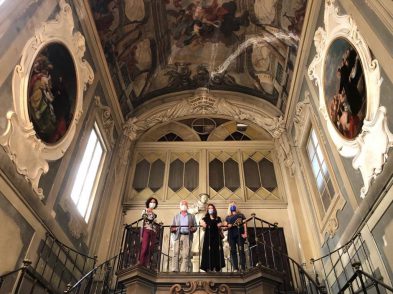Aesop, a slave who earned his freedom through storytelling, became a worthy diplomat for kings, which ultimately got him thrown off a cliff in Delphi for having insulted the city’s big wigs. His murder brought pestilence and many days of bed without dinner. His life-forming fables have never really died. Experts who advance that Aesop never actually existed apparently did not grow up in the San Francisco Bay area in the 1970s; for I can assure you that he was alive and well there, and quite the chum to my parents, who drew on his fables to defend the value of brussels sprouts and discredit the brawn of bullies.
These biographical tidbits―both Aesop’s and mine―are relevant today, for they lie at the base of the new-fangled theory I’ve been toying with all week. On my 20th anniversary of Italian ‘survival,’ I’ve decided to take a stand: Aesop must have lived in Italy not Greece, for he seems to have known loads about what makes Italians tick. Humor me by believing that all his bubbling cultural knowledge can be boiled down to a single story: ‘The Tortoise and the Hare.’
Italian tortoises work in public offices, private consortiums or artisan bottegas, speaking about the ‘excellencies of Italy’ as if slow food and hand-crafted shoes were the real meaning of life. They express their ideas with unruffled filosofia, convinced that healthy slowpokes will go immeasurably far. Chi va piano, va sano e lontano is, hands-down, their favorite adage; its triple rhyme is proof of this preference. Those in a rush have no time to mimic Mother Goose verse.
Meanwhile, cooler tortoises act like hard-shelled bartenders watching the pool-hall regulars make messes of their lives. Their sole advice is cryptic but solid: Calma e gesso, ‘calm and chalk,’ they say. What could be wiser than drawing a breath and buying shot-time by rubbing chalk on the end of your cue? With Calma e gesso, eight-balls―and everything else―have increased chances of sinking into right-corner pockets. Well-meaning, respectable folk with a love for anything century-old, tortoises are gruff but essentially contented.
Hares have what Italians call una faccia da schiaffi. They can figure things out faster than anyone else can, wrapping their ears around an issue with breakneck speed. That doesn’t mean they wish to use their skill or knowledge: they were simply born with an impertinent knack for, well, everything. Hence, the face that is ‘begging for a slap.’ Hares can also be twitchy creative types with enough nervous energy to illuminate all of Tuscany’s hillside hamlets. And if it weren’t for the ADD running rampant in their DNA, they would still have Rome with which to dominate the world. In other words, hares tend to have grilli per la testa―their heads are buzzing with cricket-like brilliance but no grounded goals. Hares don’t mind self-depreciation in the least, and they certainly don’t disparage losing. The whole race may go wrong, in Europe and elsewhere, but inside, they still revel in the innate superiority of their speed.
At dinner last night, it was time to test the theory:
‘Do you know it’s my anniversario this month?’ I asked Filippo leadingly.
Of what?’ he asked, with only a smidgen of the interest due. ‘Did you marry without me knowing?’
No,’ I conceded. ‘But someday, I will.’
He half-smiled and I continued, ‘I’m celebrating 20 years in Italy, this month. So, I’ve decided it’s time: by the end of July, I plan on having successfully encapsulated Italy’s collective identity into two simple categories.’
Filippo shrugged, somehow unimpressed. ‘That’s already been done for you―around here, people are either furbi or fessi. It’s well known. There are those who exploit and those who are idiot enough to let themselves be taken. Unfortunately, we are in the second category, both you and me.’
I agreed about our standing but, unlike Filippo, did not feel sad about it. ‘Well, in my categories there are only tartarughe e lepri―tortoises and hares.’
The fast and the slow?’ he wanted to know.
Yes, something like that,’ I nodded, preparing myself to expound the entire premise.
Filippo didn’t give me time, responding straight-away as if to a gun shot on the starting block. Italians disagree quickly, reaching their finish line before you’ve even outlined your argument.
‘Io non sono d’accordo,’ he protested. ‘I think all Italians are hares. We have the skill but don’t always run the race. It’s the country that’s tortoise-like, bogging us down with all its bureaucracy.’
Both dejected and elated, I sat, watching him steal my theory and run with it. I truly love this country. And it looks like turtle soup and rabbit stew again tonight.







